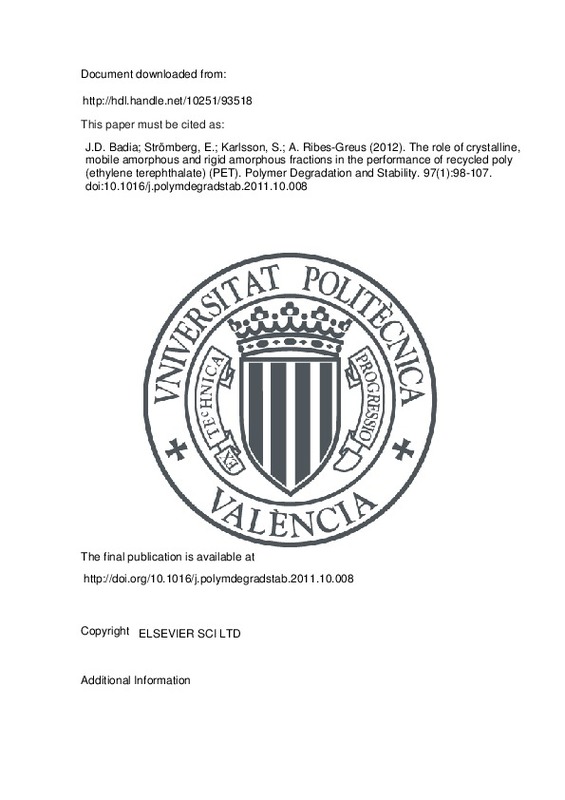Badía Valiente, JD.; Strömberg, E.; Karlsson, S.; Ribes Greus, A. (2012). Material valorisation of amorphous polylactide. Influence of thermo-mechanical degradation on the morphology, segmental dynamics, thermal and mechanical performance. Polymer Degradation and Stability. 97(4):670-678. https://doi.org/10.1016/j.polymdegradstab.2011.12.019
Por favor, use este identificador para citar o enlazar este ítem: http://hdl.handle.net/10251/150324
|
Título:
|
Material valorisation of amorphous polylactide. Influence of thermo-mechanical degradation on the morphology, segmental dynamics, thermal and mechanical performance
|
|
Autor:
|
Badía Valiente, José David
Strömberg, Emma
Karlsson, Sigbritt

 Ribes Greus, A.
Ribes Greus, A.
|
|
Entidad UPV:
|
Universitat Politècnica de València. Instituto de Tecnología de Materiales - Institut de Tecnologia de Materials
Universitat Politècnica de València. Departamento de Máquinas y Motores Térmicos - Departament de Màquines i Motors Tèrmics
|
|
Fecha difusión:
|
|
|
Resumen:
|
[EN] This paper reports the effects of multiple mechanical recycling on the structure and properties of amorphous polylactide (PLA). The influence of the thermo-mechanical degradation induced by means of five successive ...[+]
[EN] This paper reports the effects of multiple mechanical recycling on the structure and properties of amorphous polylactide (PLA). The influence of the thermo-mechanical degradation induced by means of five successive injection cycles was initially addressed in terms of macroscopic mechanical properties and surface modification. A deeper inspection on the structure and morphology of PLA was associated to the thermal properties and viscoelastic behaviour. Although FT-IR analysis did not show significant changes in functional groups, a remarkable reduction in molar mass was found by viscometry. PLA remained amorphous throughout the reprocessing cycles, but the occurrence of a cold-crystallization during DSC and DMTA measurements, which enthalpy increased with each reprocessing step, suggested chain scission due to thermo-mechanical degradation. The effect of chain shortening on the glass-rubber relaxation studied by DMTA showed an increase in free volume affecting the segmental dynamics of PLA, particularly after the application of the second reprocessing step, in connection to the overall loss of performance showed by the remaining properties. © 2012 Elsevier Ltd. All rights reserved.
[-]
|
|
Palabras clave:
|
Cold-crystallization
,
Material valorisation
,
Mechanical recycling
,
Polylactide (PLA)
,
Segmental dynamics
,
Thermo-mechanical degradation
,
Polylactides
,
Degradation
,
Dynamics
,
Functional groups
,
Recycling
,
Thermodynamic properties
,
Mechanical properties
|
|
Derechos de uso:
|
Cerrado |
|
Fuente:
|
Polymer Degradation and Stability. (issn:
0141-3910
)
|
|
DOI:
|
10.1016/j.polymdegradstab.2011.12.019
|
|
Editorial:
|
ELSEVIER SCI LTD
|
|
Versión del editor:
|
https://doi.org/10.1016/j.polymdegradstab.2011.12.019
|
|
Código del Proyecto:
|
info:eu-repo/grantAgreement/MICINN//UPOV08-3E-013/ES/ADQUISICIÓN DE EQUIPO PARA MEDIDAS DIELÉCTRICAS Y DE POLARIZACIÓN PARA NUEVOS MATERIALES APLICADOS A TECNOLOGÍAS ENERGÉTICAS/
info:eu-repo/grantAgreement/UPV//PAID-05-09-4331/
info:eu-repo/grantAgreement/GVA//ACOMP%2F2011%2F189/
|
|
Agradecimientos:
|
The authors would like to acknowledge the Spanish Ministry of Science and Innovation for the financial support through the Research Project UPOVCE-3E-013 and for the funding of a predoctoral research position to J.D. Badia ...[+]
The authors would like to acknowledge the Spanish Ministry of Science and Innovation for the financial support through the Research Project UPOVCE-3E-013 and for the funding of a predoctoral research position to J.D. Badia by means of the FPU program conceded by the Spanish Ministry for Education. The authors acknowledge the financial support of the Generalitat Valenciana through the ACOMP/2011/189. Universitat Politecnica de Valencia (UPV, Spain) is thanked for additional support through the PAID 05-09-4331 program and Royal institute of Technology (KTH, Sweden) is thanked for additional. Mr. Enrique Benavent at AIMPLAS is acknowledged for taking care of processing the material. Mr. Peter Kaali at KTH is thanked for carrying out impact tests and Mrs. Sevil Atari Jabarzadeh at KTH for helping with SEM analysis. Mrs. L. Santonja-Blasco at UPV is thanked for endless and enjoyable discussions.
[-]
|
|
Tipo:
|
Artículo
|






![[Cerrado]](/themes/UPV/images/candado.png)



